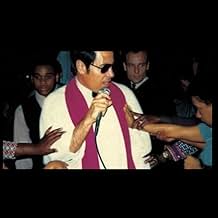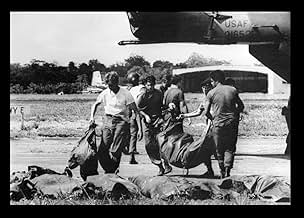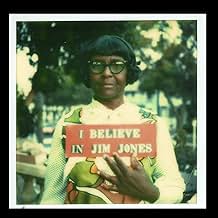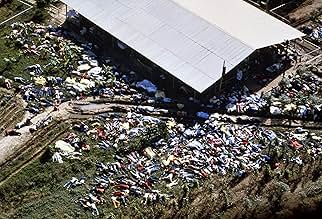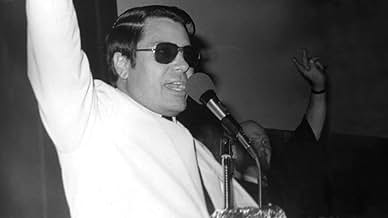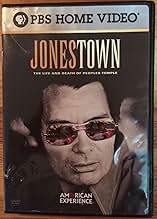Jonestown - Todeswahn einer Sekte
- 2006
- 1 Std. 26 Min.
Füge eine Handlung in deiner Sprache hinzuFeaturing never-before-seen footage, this documentary delivers a startling new look at the Peoples Temple, headed by preacher Jim Jones who, in 1978, led more than 900 members to Guyana, whe... Alles lesenFeaturing never-before-seen footage, this documentary delivers a startling new look at the Peoples Temple, headed by preacher Jim Jones who, in 1978, led more than 900 members to Guyana, where he orchestrated a mass suicide via tainted punch.Featuring never-before-seen footage, this documentary delivers a startling new look at the Peoples Temple, headed by preacher Jim Jones who, in 1978, led more than 900 members to Guyana, where he orchestrated a mass suicide via tainted punch.
- Auszeichnungen
- 1 Gewinn & 4 Nominierungen insgesamt
- Self
- (as Rev. Garnett Day)
Empfohlene Bewertungen
The whole People's Temple story always struck me as just another of the 60's cult phenomena. We had Rajneesh and his farm, and uncountable other guru's who exploited, and continue to exploit, large numbers of gullible followers. The Moonies are still with us, but well below the radar most of the time.
What's odd about Jim Jones -- to me, anyway -- is that no one really seems to know who this guy really was. This film gives more insight than anything else I've seen or read. It talks about his childhood, which was extremely poor, and his family situation, which was equally grim, so we get some insight there. But he was a very carefully guarded fellow. Always wearing those shades, always talking in the manner of a preacher. But who was he really? What was he like when he took off the robes and had a beer? We may never know. His followers certainly didn't know, and no doubt that's a major part of the problem. There is one scene in this documentary in which Jones is standing at the back of a group of people at a large gathering, and his demeanor reminded me of the dictator in North Korea -- it was that kind of vague, arrogant, totally in control look. Spooky.
The most telling comment in this film was the remark made by one of the PT's former members, who said "No one ever goes and joins a cult. They join a church, or a club." But what is the tipping point at which people can tolerate psychological and physical abuse against themselves and their friends? We don't get an answer to that. The people who made this film didn't have to tell us the answer, but it would have been a better film if they had.
There are many challenges and traps associated with telling this story and mostly this film works because it avoids the majority of them and deals well with the telling. The first challenge is to get the viewer to a point where it is at least understandable how Jones could lead such a movement to such an extent. One of the contributors says that nobody sets out to join a cult that will hurt them but yet the film makes it reasonably clear why so many people ultimately did and why so many people put up with so much out-and-out weirdness and oppression. In doing this the material naturally suggests that Jones is a monster or crazy and it would have been easy to ham this aspect up with music etc to the detriment of the film. As it works out, the film doesn't do this and instead lets events speak for themselves without really pulling cheap tricks to sensationalise or demonise anyone unnecessarily.
As a result it all comes over even handed and fair. The heavy use of those directly involved makes it a lot more interesting than a heavy narrator-led approach because you hear things first hand and have an insiders perception of events. Some viewers will feel the lack of conspiracy in the film but I did not because the film was on the general sweep of the tragedy rather than suggested stories behind it. OK so the material does a lot of the work by having a lot of inherent interest within it but even still this documentary is effectively structured with a good personal presentation that gets inside the world of the People's Temple and Jonestown.
As Jones staked out ever greater claims for himself, he placed himself on a trajectory of spiritual fraud that was so steep that any mis-step or retreat might bring his whole house of cards to the point of collapse. He therefore became hopelessly compromised: he could either become the messiah or another one of California's many prison inmates. The stress of this might explain the paranoia, the abuse of those in his power and the self-abuse that occurred as his 'ministry' progressed. In the end he had taken his loyal and long-suffering congregation so far (both emotionally and physically) that he must have reasoned that the only way of evading an wretched reckoning was by some form of abdication - which took the form of his own suicide and the murder of almost all of his followers. Jones was all of a piece with the likes of Charles Manson or David Koresh.
In view of his increasingly outré behaviour, it was almost inevitable that he should have gravitated towards San Francisco and that he should have become prominent in local politics under the aegis of the well-meaning (but arguably misguided) George Moscone. The film does not mention the close connections between the doomed Leo Ryan and Moscone, nor the imminent assassination of Moscone and Harvey Milk by Dan White. That was unfortunate, because it underscored the strangeness of this remarkable story. However, it is by no means a fatal omission. I would have appreciated some detail on the attitude of the Guyanese authorities to this strange Temple in the jungle. Did the government of Forbes Burnham and Arthur Chung know anything about it and the danger that cult members were in? Did they make any attempt to intervene?
I saw this film as part of the 2006 Times/BFI London Film Festival, and it is regrettable that it did not receive more publicity (not least in The Times itself). The story was told dead straight with little of the ostentatious editing that is now so common in documentaries, and is all the more effective for it. The audience left the theatre in something approaching a state of utter desolation - a tribute to the terrible nature of the story, the integrity of the witnesses and the ability of Stanley Nelson and his colleagues.
The film contains many scenes (footage of services in People's Temple) that seem joyous - and they are all the more tragic for that. Yet I could never quite tell what was in the eyes of all these doomed worshippers (many of whom were otherwise helpless, lonely and frail). Was it rapture or was it...terror?
It's not clear if it will get distributed theatrically but, if not, the director said it will air on PBS in 2007. Highly recommended.
Wusstest du schon
- WissenswertesBased on the same real life events as Jonestown Cult Suicide (2012), Jonestown Massacre: As We Watched (2018), Jonestown - Massenselbstmord einer Sekte (2018), Jonestown (2013), Jonestown: Paradise Lost (2007), Jonestown: The Women Behind the Massacre (2018), Guyana-Massaker - Tor zur Hölle (1980), The Jonestown Haunting (2020), Jonestown: The Life and Death of the Peoples Temple (2007), The Jonestown Massacre (2016) and Truth and Lies: Jonestown, Paradise Lost (2018).
- Zitate
Deborah Layton: [on Jim Jones's brainwashing of his followers at Jonestown] Every night at some point, his voice would come over the loudspeaker, and he'd say, "I'm sending somebody out tonight. Somebody you know. Somebody you trust. And they're gonna act like they wanna leave. But this is a loyalty test, and you need to turn them in."
- SoundtracksWelcome
Performed by the People's Temple Choir
Top-Auswahl
- How long is Jonestown: The Life and Death of Peoples Temple?Powered by Alexa
Details
- Erscheinungsdatum
- Herkunftsland
- Offizieller Standort
- Sprache
- Auch bekannt als
- Jonestown: The Life and Death of Peoples Temple
- Produktionsfirma
- Weitere beteiligte Unternehmen bei IMDbPro anzeigen
Box Office
- Bruttoertrag in den USA und Kanada
- 148.292 $
- Eröffnungswochenende in den USA und in Kanada
- 7.482 $
- 22. Okt. 2006
- Weltweiter Bruttoertrag
- 148.292 $
Zu dieser Seite beitragen





